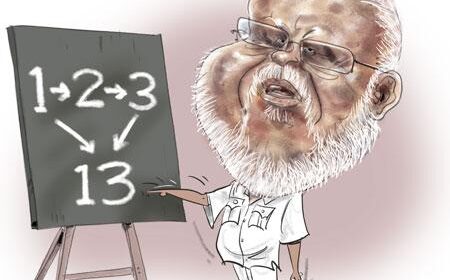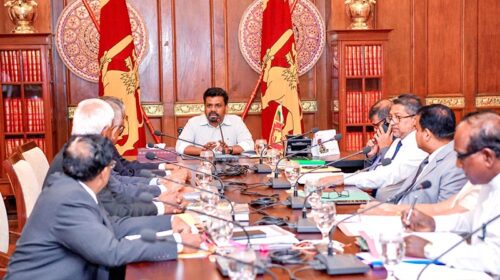Kelum Bandara Mirror on line (23-02-2023)
Some powers devolved to the Provincial Councils have been taken through actions by the executive arm or through administrative decisions. I am asking for the transfer of such powers back to the Provincial Councils as the first step
The TNA wants the problem unsolved. They work for it. The President openly said he is prepared to settle all the pertaining issues- political issues, land issues etc. We have to support him. But, the TNA is not cooperative
 Fisheries Minister Douglas Devananda responds to questions from Daily Mirror on the move to implement the 13th Amendment and the fisheries issue involving India and Sri Lanka. Mr Devananda is the leader of the Eelam People’s Democratic Party (EPDP).
Fisheries Minister Douglas Devananda responds to questions from Daily Mirror on the move to implement the 13th Amendment and the fisheries issue involving India and Sri Lanka. Mr Devananda is the leader of the Eelam People’s Democratic Party (EPDP).
Excerpts:
Q You have stood for the implementation of the 13th Amendment to the Constitution right throughout. Now there are talks about moves to implement it in full. Do you believe it is a reality?
Starting from the very beginning, the Government and the Opposition, be it whatever party, have failed to see eye to eye on it. Two parties Governed the country from time to time. When one tried to implement it, the other side always stood in the way. That is the nature of southern politics.
I have said from the very beginning that the 13th Amendment should be implemented in stages. It is already part of our constitution. All the provinces in the country outside the North and the East enjoyed such powers devolved. When the conference of Chief Ministers took place in the past, they insisted on more powers. Some powers devolved to the Provincial Councils have been taken through actions by the executive arm or through administrative decisions. I am asking for the transfer of such powers back to the Provincial Councils as the first step.The President or the Prime Minister can do it by placing just their signatures. In the next stage, you can simply implement other powers. Only in the final stage, you can talk about the devolution of land and police powers to the Provincial Councils. Once there is consensus after reconciliation among all the communities, we can discuss the last stage. Today, everyone is confused about the last stage which I mentioned. We cannot implement the last stage immediately. That is why I said it could be done in three stages.
Through executive and administrative actions, the centre has wrongfully retracted powers over more than 30 years.
Q Do you remain positive that the 13th Amendment will be implemented this time in full?
The President is clear on it. At the all-party conference, almost all the parties agreed. I am going to hold talks with the Mahanayake Theras. Only the Tamil National Alliance (TNA) is creating problems. The TNA wants the problem unsolved. They work for it. The President openly said he is prepared to settle all the pertaining issues- political issues, land issues etc. We have to support him. But, the TNA is not cooperative. They try to land the President in trouble so that the problem is not addressed. In 1990, I came to Sri Lanka with three things in mind. First, it was to join the mainstream. Then, I wanted to settle the problem through the Parliamentary system and reconciliation. I went to India in 1986. I entered mainstream politics and joined Parliamentary democracy. The LTTE and other Tamil parties went against this policy. They tried to assassinate me several times. My people were killed. Some were chased out of the country. They could not stop me. They tarnished my name. Today, the LTTE and its leader Velupillai Prabhakaran are no more. History has proven that my stand is correct. It is only becoming a reality. I am going to talk to the Mahanayake Theras. They will accept my position.
Q Recently, you met with Indian External Affairs Minister Dr S. Jaishankar. What is India’s latest stand?
The 13th Amendment is their baby. India is vocal about its implementation. At times, India is silent. But, I have been persistent on this matter. When the Tamil parties went together to meet him, I went separately. He said this is the only way to settle the problem. The other parties agreed willingly or unwillingly.
Q What do you think is the role of India this time when other Tamil parties such as All Ceylon Tamil Congress try to stand in the way of implementing the 13th Amendment?
They all agreed with Dr Jaishankar. They submitted various proposals such as Federalism. But, Dr Jaishankar was categorical that the implementation of the 13th Amendment is the way forward in keeping with the situation of the country.
Opposition Leader Sajith Premadasa said he is prepared to address the problem within the contours of a unitary constitution. Federalism is anathema to the Sinhala people. Likewise, the unitary status is anathema to the Tamil people. That is the reality. I also believe we can find a solution within a unitary country (Ekiya Rajya). That is the practical and possible way. Even Prabhakaran could not achieve anything through other means.
Q My next question is about the fisheries issue with India. Different governments have tried to settle it, but the problem persists. It continues. In your view, why does the problem continue to be an irritant?
The problem has in fact aggravated now. We handle it in a few ways. One is the diplomatic approach. The other one is through legal action. Poaching in our waters is prohibited legally in terms of the law of the country. We arrest those poaching and produced them in a court of law. They can get bailed out, but their fishing equipment including boats are confiscated. I am going to hand over such confiscated boats to the local fishermen’s associations. Our boats are like auto rickshaws whereas their ones are like Elf trucks. When they operate their boats, our fishermen cannot go and fish. They destroy the fishing gear of our fishermen.
Then, there is the Joint Working Group. When the Indian External Affairs Minister came, I stressed the point that it should be addressed. Otherwise, it may lead to clashes between fishermen on both sides. Recently, the Indian Union Minister of Fisheries L. Murugan visited Sri Lanka. I discussed the matter with him. When President Ranil Wickremesinghe visits India, he will take up the matter. Earlier, Mr Murugan was the Tamil Nadu leader of the ruling Bharatiya Janatha Party (BJP).
Our issue is a justifiable one. There are proposals from their end. That is to give a license for them to fish here. I said no to bottom trawling. The sea bed of the Indian side is already destroyed. Now they come to our side. Fish have no passports. They move freely. If Indian fishermen destroy our side too, there won’t be fish for both sides.
 Provincial Councils Should Act to Improve the Living Conditions of the People
Provincial Councils Should Act to Improve the Living Conditions of the People Fisheries Minister Douglas Devananda responds to questions from Daily Mirror on the move to implement the 13th Amendment and the fisheries issue involving India and Sri Lanka. Mr Devananda is the leader of the Eelam People’s Democratic Party (EPDP).
Fisheries Minister Douglas Devananda responds to questions from Daily Mirror on the move to implement the 13th Amendment and the fisheries issue involving India and Sri Lanka. Mr Devananda is the leader of the Eelam People’s Democratic Party (EPDP).